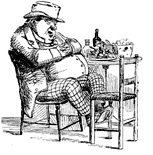
Sloth
HARVARD DIARY
In Sunday school, listening to enumerations of sin — the kinds thereof, their significance in God’s scheme of things — my brother and I always perked up at the mention of sloth: a great word, one that evoked, of course, some exceedingly slow-moving creature that surely must know how to get the best out of this life without too much exertion. Pressed by our parents to do our chores, to work hard at school, to find ways to give unto others as we would want given to ourselves (some of those pieties even pasted on the refrigerator, from time to time, confronting us as we tried to indulge in a snack), we wondered whether sloth might be the grandest state of all — just to lie about, and indeed to become lay-abouts!
I remember discussing this matter with my dad — and his reasons for disagreement with us were clearly, decisively stated: We live in a society that requires every possible effort from every one of its citizens. He was all for that in his own life — industriousness, a dedication to various duties and responsibilities. He not only worked hard, he expected others to do so — not only us, his children, but anyone anywhere. He voted Republican. He had a profound distrust of government — it is something that has to be carefully watched, lest it curb the initiative of citizens. As for those citizens who seemed headed nowhere, whose lives are hard-pressed and marginal, he refused to see them as beyond…well, their own possible redemption, if only they would “work hard,” be “resourceful,” “refuse to take life lying down.” I remember those phrases even now, though I fear a recitation of them makes my dad sound hard-hearted, callous. In fact, he had his own way of showing respect to the poor. They needed no condescension from the rest of us, no “depending” upon this or that program or agency; they needed, in a way, themselves — an ethic of personal sustenance, of energy committed to action. He was forever, in that regard, pointing out the “want ads” in the papers — the opportunities that awaited “anyone.” My mother took sharp and constant issue with that line of reasoning, with that idealized work ethic (the notion that anyone who “really” wanted a job could find one). She voted Democratic. She was forever reminding us how cruel and unfair life can be for some people who are down on their luck, not because they don’t want to work, haven’t tried to find work, but because (for instance) no work is available to them, because of who they are. For dad, ingenuity and determination would ultimately prevail; for mom, this world can make a mockery of those traits, turn people into disillusioned, embittered souls, because they have tried and tried to no avail.
I now realize how much those two parents of mine had in common, despite their opposing political and social views, their apparent disagreement with respect to the relationship between individual psychology and the society to which a particular person belongs. Both my mother and father took for granted the importance of hard, hard work, of personal initiative constantly put on the line. We ought to be, they both insisted, diligent, productive, energetic, conscientious, busy, tireless. We ought not be lazy, lethargic, idle — slothful. Later, in college, when I would read Max Weber’s The Protestant Ethic and the Spirit of Capitalism, I would realize how well my folks had adapted to the demands of that ethic, and consequently how much it informed their lives, their manner of living, and, too, the values they handed on to their children.
But if they agreed on the vice of sloth in everyday secular life, they certainly disagreed on the applicability of such a word to the spiritual life. Dad wanted everyone to be conscientious (as he surely was), but if someone turned out to be a crook, a delinquent, that person was bad, and ought to be severely punished, period. He had no great interest in the psychology of the criminal, nor did he think of such a person’s possible wrongdoing as forgivable as a consequence of his social, economic, or racial background. Mother, on the other hand, was worried about why people turned out bad, went awry or amok, and she constantly wondered how such people might be “redeemed,” a word my dad was not at all inclined to use. Still, her idea of how such redemption took place was not completely at odds with that of her husband: by prayers and persuasion, by psychotherapy — forces from the outside brought to bear on an errant soul, even as dad wanted the force of the law to do likewise.
You May Also Enjoy
When I was in college I had a roommate during my freshman year who was…
What ever our motives, problems, conflicts, our secret and not so secret passions, the real moral test of our worth has to be what we do with ourselves in the course of our everyday lives.
Review of Harvard Diary by Robert Coles

